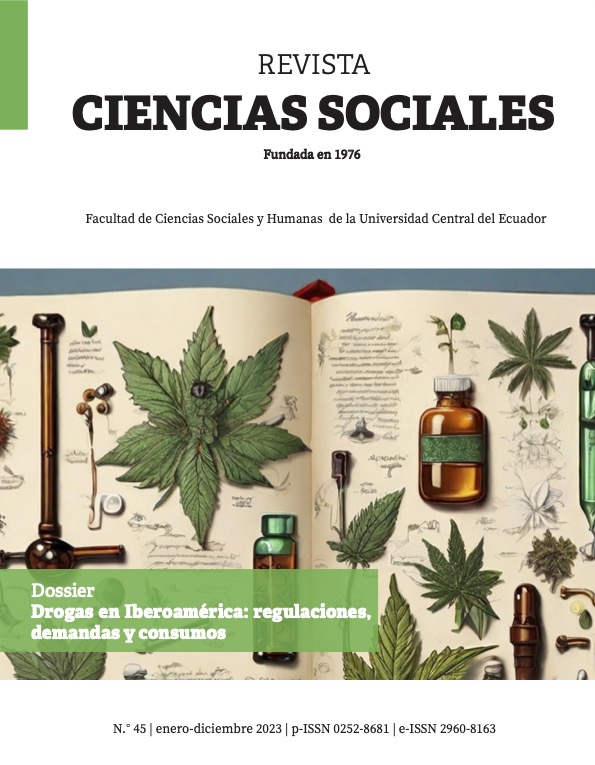S. O. S. Erradicación de derechos, historias y narrativas alrededor de las drogas.
Presentación del dossier «Drogas en Iberoamérica: regulación, demandas y consumos»
Palabras clave:
Drogas en Iberoamérica, Regulación, Demandas, Consumos, DossierResumen
La regulación de las sustancias psicoactivas sigue siendo un tema de debate: algunos países despenalizan la posesión y el consumo de drogas, mientras que otros mantienen la pena de muerte por delitos relacionados con las drogas. La venta de sustancias ilegales implica muchas veces conflictos laborales y falta de alternativas de inversión en la economía legal. En América Latina, las políticas de drogas suelen ser ineficaces y problemáticas, e incluso disímiles en cada uno de los países, por ejemplo, en el caso de Bolivia se aboga por un consumo responsable y funcional, mientras que en Ecuador el prohibicionismo es incongruente con la realidad de quienes consumen y venden cannabis. Este dossier ofrece diversas perspectivas sobre la regulación, demanda y consumo de sustancias psicoactivas en Iberoamérica.
Descargas
Citas
Achá, G. (2021). La persecución penal de las personas que consumen drogas en Bolivia. Análisis de la inconstitucionalidad del artículo 49 de la Ley 1008. Acción Andina Bolivia
Belackova, V., Rychert, M., Wilkins, C., y Decorte, T. (2023). Drug Social Clubs the next social club generation? En Pardal, M. (Ed.). The Cannabis Social Club (pp. 209-236). Routledge.
Bourgois, P. (2010). “La administración de una casa de crack: dependencia, disciplina y dignidad”. En Busca del respeto. Vendiendo crack en Harlem, 103-136. Siglo XXI.
Caiuby Labate, B. y Rodrigues, T. (2023). The impacts of the drug war on Indigenous Peoples in Latin America: An overview. Journal of Psychedelic Studies, 7 (1), 48–57. doi: 10.1556/2054.2023.00239
Emerson, B. (2019). Regulation of illegal drugs no longer what? but how? Journal of Illicit Economies and Development, 1(3), 251–254. doi:10.31389/jied.19.
Ghiringhelli de Azevedo, R. Girardi Hypolito, L. (2023). Política penal de drogas en Brasil. Un estudio contemporáneo sobre la legislación y sus impactos. Revista de Ciencias Sociales, 36(53), 63-88. DOI: http://dx.doi.org/10.26489/rvs.v36i53.3
Girelli, G., Jofré, M. y Larasati A. (2023). The Death Penalty for Drug Offences: Global Overview 2022. Harm Reduction International.
Hughes, C., & Stevens, A. (2012). A resounding success or a disastrous failure: Reexamining the interpretation of evidence on the Portuguese decriminalisation of illicit drugs. Drug and Alcohol Review, 31(1), 101–113. doi:10.1111/j.1465-3362.2011.00383.x.
Labiano, Virginia. 2020. Estilos estatales de regulación de las drogas ilegales en Sudamérica. Revista Mexicana de Ciencias Políticas y Sociales - Nueva Época-, LXV (240): 89-118. doi: http://dx.doi.org/10.22201/fcpys.2448492xe.2020.240.67073
Pérez, C., e Ibarrola, A. (2023). La transición hacia el fentanilo. Cambios y continuidades del mercado de drogas en México (2015-2022). Revista de Ciencias Sociales, 36(53), 15-36. DOI: http://dx.doi.org/10.26489/rvs.v36i53.1
Rodríguez Mera, A. (2023). Dos visiones mediáticas, un objeto de regulación: legitimación para unos, criminalización para otros. Quórum Académico, 20(1), 14-48. https://produccioncientificaluz.org/index.php/quorum/article/view/40401
Publicado
Cómo citar
Número
Sección
Licencia
Derechos de autor 2023 Andrés Rodríguez Mera (Coordinador de Dossier); Mónica Hinojosa-Becerra, Isidro Marín-Gutiérrez, Ángel Torres-Toukoumidis

Esta obra está bajo una licencia internacional Creative Commons Atribución-NoComercial 4.0.
Política de acceso abierto
La revista Ciencias Sociales adhiere al modelo Acceso Abierto en el que los contenidos de las publicaciones científicas se encuentran disponibles a texto completo libre y gratuito en Internet, sin embargos temporales, y cuyos costos de producción editorial no son transferidos a los/las autores/as.
En ese sentido, no existe costo alguno para los/as autores/as en el envío o durante el proceso editorial, defendiendo el derecho a la información con equidad e iguales oportunidades de acceso.
Licencia y derechos de autor/a
Los autores conservan todos los derechos de publicación del artículo y conceden a la Revista Ciencias Sociales una licencia no exclusiva, intrasferible y sin regalías por duración ilimitada para su reproducción, distribución y comunicación pública a nivel mundial bajo una Licencia Creative Commons Atribución 4.0 Internacional (CC BY NC 4.0)


